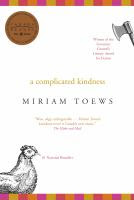In the spirit of #CrazyForCanLit, as well as
Women’s History Month, I had a plan to write a blog post about my top
five CanLit heroines. However, when I went through my short list of personal
favourites, I realized that many of my favourite female characters in Canadian literature were
personally connected to me in some way through geography or ethnic background. Here are a couple of my very personal favourites:
 Sandra Birdsell’s 2001 Giller-nominated novel, The Russländer, is a very personal read for me. The story follows the life of Katya Vogt, an elderly Mennonite woman living in Winnipeg who remembers her life as a young girl living in Russia at the time of World War I and the Russian Revolution. Katya's life as a child is mostly happy, but her family eventually becomes caught in the violence that erupts between the wealthy landowners and the impoverished Russian workers. We see the horrifying results of these tensions through Katya's eyes, and watch her attempt to come to terms with this tragedy even as an elderly woman now living safely in Canada.
Sandra Birdsell’s 2001 Giller-nominated novel, The Russländer, is a very personal read for me. The story follows the life of Katya Vogt, an elderly Mennonite woman living in Winnipeg who remembers her life as a young girl living in Russia at the time of World War I and the Russian Revolution. Katya's life as a child is mostly happy, but her family eventually becomes caught in the violence that erupts between the wealthy landowners and the impoverished Russian workers. We see the horrifying results of these tensions through Katya's eyes, and watch her attempt to come to terms with this tragedy even as an elderly woman now living safely in Canada. This book echoes my own grandmother's experiences about living in Russia as a teenager in the same time period, and gave me a richer understanding of the stoic but unwavering religious faith of my Mennonite ancestors. In recent days, I have thought a lot about these refugee ancestors of mine, who were actually banned from immigrating to Canada between 1919 and 1922, along with Doukhobors and Hutterites, due to their alarming religious views and tendency to not assimilate to the greater Canadian culture. The parallels with current political situations are impossible to ignore, and I credit books like The Russländer with strengthening my empathy towards our modern day refugees of war, because it reminds me that this too is my own history.
We’re Mennonites. After Dukhobors who show up naked in court we are the most embarrassing sub-sect of people to belong to if you’re a teenager.... Imagine the least well-adjusted kid in your school starting a breakaway clique of people whose manifesto includes a ban on the media, dancing, smoking , temperate climates, movies, drinking, rock’n’roll, having sex for fun, swimming, makeup, jewellery, playing pool, going to cities, or staying up past nine o’clock. That was Menno all over. Thanks a lot, Menno.
Canadian literature provides readers with a wonderful range of characters with wildly diverse experiences, but when it comes down to it – I love CanLit because I see myself reflected in some of these stories.








No comments:
Post a Comment